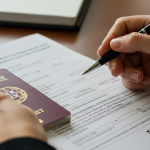
Currency Exchange Tips for Portugal: Making Your Euros Go Further
Imagine this: You’ve finally arrived in Portugal, ready to soak up the sun, explore ancient castles, and savor delicious pastel de nata. But before you can fully embrace the Portuguese lifestyle, there’s a practical matter to address: currency exchange. Getting the best exchange rate can be the difference between enjoying an extra glass of vinho verde and sticking to tap water. Whether you’re a tourist or planning on setting up a business in Portugal, understanding the nuances of currency exchange is essential.
Key Takeaways:
- Research exchange rates before you travel to get a baseline understanding.
- Avoid exchanging currency at airports and tourist traps, where rates are often unfavorable.
- Consider using a debit or credit card with no foreign transaction fees for everyday purchases.
- Explore online currency exchange services for potentially better rates than traditional banks.
- Be aware of potential fees associated with currency exchange, including commissions and hidden charges.
Understanding the Basics of Currency Exchange in Portugal
Portugal uses the Euro (€), so if you’re coming from outside the Eurozone, you’ll need to exchange your currency. The exchange rate fluctuates constantly, influenced by economic factors, political events, and market sentiment. Keeping an eye on these fluctuations can help you time your exchanges for optimal value.
Monitoring Exchange Rates: Your First Line of Defense
Before you even pack your bags, start tracking the EUR exchange rate against your home currency. Websites like Google Finance, XE.com, and Bloomberg provide real-time exchange rates and historical data. This will give you a sense of what a “good” rate looks like and help you avoid getting ripped off.
Pro Tip: Set up a rate alert on your phone. Many currency exchange apps will notify you when the exchange rate reaches a specific level, allowing you to pounce when the time is right.
The Pitfalls of Airport Exchanges
Airports are notorious for offering some of the worst exchange rates. They know you’re a captive audience, arriving in a new country with an immediate need for local currency. The convenience comes at a steep price. The same applies to currency exchange booths in popular tourist areas.
“I once exchanged $200 at Lisbon Airport and lost nearly 20 euros compared to what I would have gotten at a local bank,” shares Maria, a frequent traveler to Portugal. “Lesson learned: never exchange at the airport!”
Banks vs. Currency Exchange Services
Traditional banks in Portugal, such as Caixa Geral de Depósitos or Novo Banco, offer currency exchange services. While they’re generally more reliable than airport booths, their rates may not be the most competitive. Currency exchange services, like Unimoni or MoneyGram, often offer better rates, but it’s crucial to compare rates and fees carefully.
Methods of Currency Exchange: Choosing the Right Option
There are several ways to exchange your currency for euros in Portugal. Each method has its advantages and disadvantages, so it’s important to weigh your options carefully.
Using ATMs: A Convenient Option
ATMs are readily available throughout Portugal, and they can be a convenient way to withdraw euros directly from your bank account. However, be mindful of potential fees. Your bank may charge a foreign transaction fee, and the ATM operator may also impose a surcharge.
- Tip: Opt to be charged in the local currency (euros) rather than your home currency. This allows your bank to handle the conversion, which usually results in a better exchange rate than the ATM’s dynamic currency conversion (DCC).
Credit and Debit Cards: A Modern Approach
Using a credit or debit card for purchases is often the most convenient option, especially for smaller transactions. Look for cards with no foreign transaction fees, as these can quickly add up.
- Note: Inform your bank that you’ll be traveling to Portugal to avoid having your card blocked due to suspected fraud.
Online Currency Exchange Services: The Digital Advantage
Online currency exchange services, such as Wise (formerly TransferWise) or Revolut, offer competitive exchange rates and low fees. You can transfer money online and withdraw it from an ATM in Portugal or use a debit card issued by the service.
- Benefit: These services often provide transparent pricing, so you know exactly how much you’re paying in fees and what exchange rate you’re getting.
Cash vs. Card: Finding the Right Balance
While cards are convenient, it’s always a good idea to have some cash on hand, especially for smaller establishments, local markets, and tipping. A mix of both cash and card provides flexibility and ensures you’re prepared for any situation.
Minimizing Fees and Maximizing Value
Fees can significantly erode the value of your currency exchange. Here’s how to minimize them and get the most euros for your money.
Understanding Hidden Fees
Many currency exchange services advertise “zero commission” or “no fees,” but they often hide their profits in a less favorable exchange rate. Always compare the final amount you’ll receive after all fees are factored in.
Negotiating Exchange Rates
If you’re exchanging a large sum of money, don’t be afraid to negotiate the exchange rate. Banks and currency exchange services may be willing to offer a better rate, especially for larger transactions.
Avoiding Dynamic Currency Conversion (DCC)
DCC is a service that allows you to pay in your home currency when using your credit or debit card abroad. While it may seem convenient, DCC usually results in a worse exchange rate and higher fees. Always choose to be charged in the local currency (euros).
Specific Scenarios: Currency Exchange for Different Needs
The best currency exchange strategy depends on your specific needs and circumstances.
Tourists: Short-Term Visitors
For tourists visiting Portugal for a short period, using a combination of a credit card with no foreign transaction fees and withdrawing cash from ATMs is often the most convenient and cost-effective approach.
Expats: Long-Term Residents
Expats planning to live in Portugal for an extended period should consider opening a local bank account and using online currency exchange services to transfer larger sums of money. This can save a significant amount on fees over time.
Setting up a business in Portugal: Currency Considerations
For entrepreneurs setting up a business in Portugal, managing currency exchange is crucial. Opening a business bank account in euros is essential. Regularly transferring funds from your home country to cover business expenses requires careful planning to minimize exchange rate fluctuations and fees. Consider using a forward contract to lock in a favorable exchange rate for future transfers.
Anecdote: The Value of Research
“When I first moved to Portugal to start my business, I didn’t pay much attention to currency exchange,” recalls John, an American entrepreneur. “I just used my US debit card for everything. It wasn’t until I reviewed my bank statements that I realized how much I was losing in foreign transaction fees. Switching to a card with no fees and using Wise for larger transfers saved me hundreds of euros each month.”
Interactive Tool: Currency Exchange Comparison
To help you make informed decisions, here’s an interactive tool to compare currency exchange rates and fees from different providers.
Currency Exchange Comparison
Enter the amount you want to convert from USD to EUR:
| Provider | Exchange Rate (EUR/USD) | Fee (%) | EUR Received |
|---|---|---|---|
| Bank A | 1 EUR = 1.08 USD | 2% | |
| Exchange Service B | 1 EUR = 1.07 USD | 1% | |
| Online Platform C | 1 EUR = 1.06 USD | 0.5% |
Additional Tips for Savvy Currency Exchange
Beyond the basics, here are some additional tips to help you become a currency exchange pro in Portugal.
Consider a Travel Credit Card
Travel credit cards often offer benefits such as no foreign transaction fees, travel insurance, and rewards points that can be redeemed for travel expenses. Research different cards and choose one that aligns with your travel habits.
Be Aware of Local Customs
In Portugal, it’s customary to tip around 10% in restaurants and cafes. Having small denominations of euros on hand for tipping is always a good idea.
Plan Ahead
Don’t wait until the last minute to exchange your currency. Give yourself ample time to research exchange rates and compare different options.
Research Local Banks for Long Term Needs
If you are planning on setting up a business in Portugal, you will need to do some research on local banks to find the best fit for your needs. Many will have different requirements for opening an account, and you will want to make sure that you meet those requirements before you go to open the account.
Internal links to visit
Here are some helpful links you may find useful:
- Planting an apple tree: https://appletreesforsale.org/planting-an-apple-tree-easy-steps-for-success/
- Best fertilizer for apple trees: https://appletreesforsale.org/what-is-the-best-fertilizer-for-apple-trees/
- Growing the perfect honeycrisp tree: https://appletreesforsale.org/growing-the-perfect-honeycrisp-tree-a-complete-guide-for-apple-enthusiasts/
Conclusion: Mastering Currency Exchange in Portugal
Navigating currency exchange in Portugal doesn’t have to be daunting. By understanding the basics, exploring different options, and minimizing fees, you can ensure that you get the most euros for your money. Whether you’re a tourist, an expat, or an entrepreneur setting up a business in Portugal, these tips will help you make informed decisions and enjoy your time in this beautiful country without breaking the bank. So, go ahead, explore the vibrant streets of Lisbon, indulge in the local cuisine, and make the most of your Portuguese adventure! Remember to always be vigilant, compare rates, and plan ahead. Your wallet will thank you.



